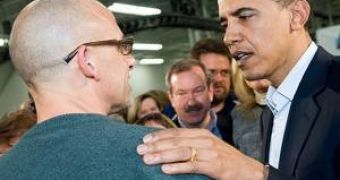Hillary Clinton, John Edwards, John McCain and yesterday Barack Obama are the four most important candidates that have given speeches at Google. All with good chances, all crowd pleasers and charismatic figures (they must be, or else they wouldn't have been running for president), all with something to prove, all well received by the Google employees.
What differentiates them? Well?except for their political creed and parties? The impact they have on the masses. And Obama seems to be a sure winner in that category, his speech yesterday was exhilarating for the people over at Google. Some employees lined up more than an hour to hear him while others crowded the rafters above the auditorium. "There's definitely been a buzz here all day," said Nicole Resz, 26, who works in Google's advertising department. "I've never seen so many people at a Google event. We've had everybody, we've had Mikhail Gorbachev."
The Democratic presidential candidate quickly appealed to the people in front of him by comparing his astoundingly quick political ascension to that of Google, momentarily the "lifeblood of the Internet," as he portrayed it. Obama noted that a decade ago, he was a little-known Illinois senator while the founders of the Great Search Engine, Sergey Brin and Larry Page were university students with big dreams and cited the Google founders' success when asked about his relative lack of political experience: "I suppose Sergey and Larry did not have a lot of experience starting a Fortune 100 company."
The speech he addressed the hundreds of employees that overcrowded the caf? was tailored to that specific Internet-savvy audience and described the importance of technology in winning in the global economy and in many more areas like health care and clean energy. He further pledged to post government data on the Internet "in universally accessible formats.
He was not caught off guard by Google's CEO Eric Schmidt, event moderator, who asked him for the most efficient way to sort a million 32-bit integers. He quickly answered that he would not particularly favor the bubble sort method and impressed the engineers present by this reference to a method of sorting out numerical algorithms. "You answered the question correctly", Schmidt said.
As a matter of fact, he did not answer the question directly, but that's politics for you.

 14 DAY TRIAL //
14 DAY TRIAL //